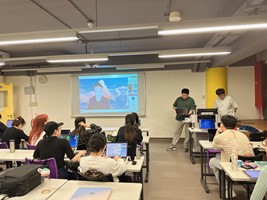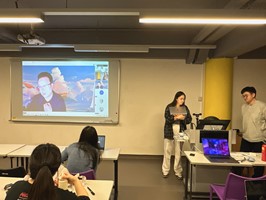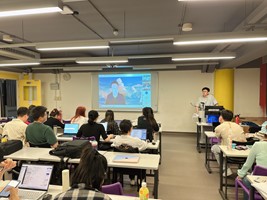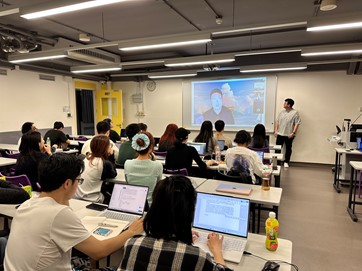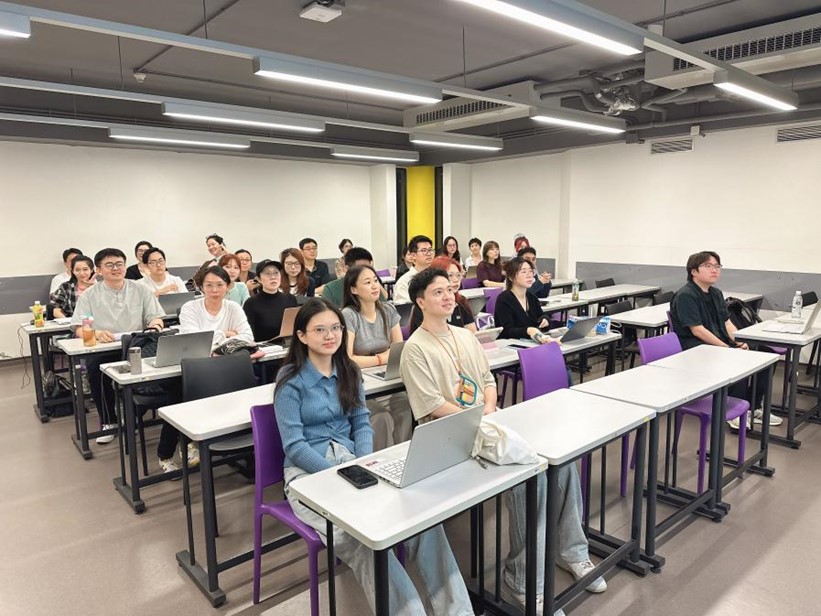The Faculty of Humanities and Social Sciences at the City University of Macau hosted an academic lecture titled Cultural Trade and Communication in the Digital Age on April 11, 2025, from 19:00 to 22:00. The event featured Professor Luo Libin, Vice Dean of the School of Economics at Beijing International Studies University and a renowned scholar in the field, as the keynote speaker. The lecture focused on the paradigm shift in cultural trade and innovation in communication mechanisms in the era of the digital economy, exploring how digital technologies are reshaping the global cultural industry chain.
During the three-hour session, Professor Luo presented his 15 years of research findings, proposing that digital technology has triggered a “dual revolution” in cultural production and dissemination. Through empirical analysis, he demonstrated how digital expansion transcends physical market boundaries and mitigates “winner takes all” phenomena in traditional cultural trade through long-tail effects. His original research highlighted how AI and big data significantly enhance productivity in cultural innovation, supported by operational data from academic platforms like “Cultural Trade Observer” and “Digital Cultural Innovation Research.”
A key highlight of the lecture was Professor Luo’s innovative proposition of a “Model for the Development of a Cultural Powerhouse,” emphasizing the strategic importance of a mega-domestic market in shaping global cultural factor allocation. He argued that once a local market surpasses a critical scale threshold, it generates a siphon effect for cultural production factors, influencing the formulation of international cultural trade rules. This theory sparked active discussion among attendees, particularly on balancing economies of scale and cultural diversity preservation. In the dialogue session, Professor Ma Ming noted that the model provides a quantitative analytical framework for Macau’s development as a “base of multicultural coexistence.”
During the Q&A session, doctoral students Liu Ziye and Zhao Guangyuan from the Cultural Industries PhD Program engaged with Professor Luo on topics such as the international distribution of Chinese cinema and policy innovation in cultural trade. Professor Luo encouraged Macau to leverage its unique role as a cultural hub between China and Portuguese-speaking countries, suggesting the creation of a digital cultural trade database to build a new cultural factor circulation network along the Belt and Road Initiative.
Professor Luo Libin is Vice Dean and Professor at the School of Economics, Beijing International Studies University. He also serves as a Visiting Researcher at Tsinghua University’s Institute for Service Economy and Digital Governance and as a Senior Researcher at the Capital Research Base for International Cultural Trade. As an authoritative expert in cultural trade and international economics, his research focuses on service trade, international investment, and the digital cultural economy. He has undertaken academic visits to prestigious institutions such as the University of Minnesota and the University of Sydney. He has lectured at several universities, including the City University of Macau and the University of North Florida, earning national and international recognition.
The Faculty of Humanities and Social Sciences, a key academic unit at the City University of Macau, is committed to cultivating innovative talents with a global perspective in the cultural industries. Through initiatives such as the PhD Program in Cultural Industries, the Faculty continues to promote interdisciplinary research and contribute intellectual support to Macau’s integration into national cultural development strategies and its role as a platform for cultural exchange characterized by the coexistence of Chinese and diverse global cultures.


 Search
Search Language
Language 
